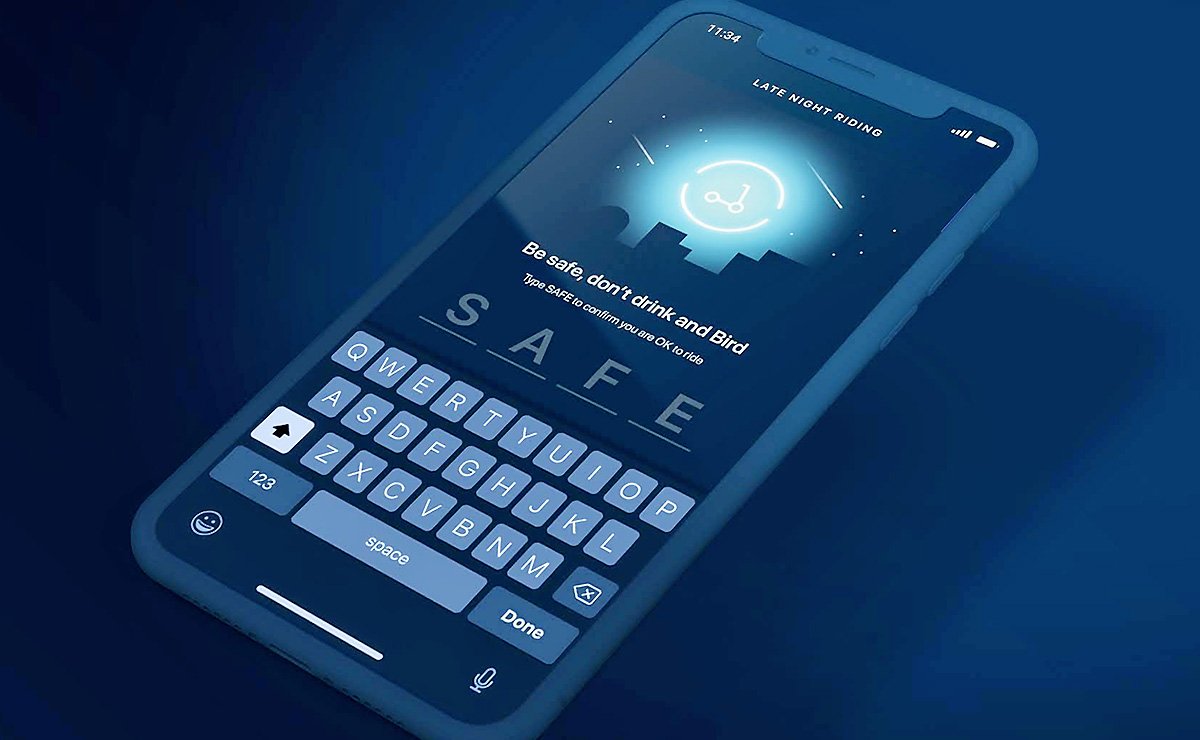<!–*/ */ /*–>*/
| Scooter app adds feature to discourage riding under the influence |

In addition to the dangers of driving under the influence, we should consider the dangers of scooting under the influence.
Shared electric scooter services are an alternative for those who do not own a car and do not wish to hire a Lyft or Uber. But along with the convenience comes a potential problem: people using scooters while intoxicated.
Scooter company Bird, which has more than 250 partner cities throughout the world, has taken note of this concern and is launching a “checkpoint” within its app called Safe Start. It’s designed to discourage people from riding scooters under the influence.
Riders attempting to use a Bird scooter between 10 p.m. and 4 a.m. will have to verify they can safely use the scooter by correctly entering a keyword into the app.
Bird says the app feature is a way to encourage those who might be under the influence to choose an alternative method of transportation such as a taxi or ride-hailing service. Bird will work with city officials to monitor the effectiveness of the checkpoint.
“Sometimes all you need is that one reminder, that critical moment of deterrence, to change someone’s mind and prevent a potentially unsafe situation from taking place,” Detective Lt. Mark Marquis of the Tiffin, Ohio, police department, said in a blog post by Bird. “Safe Start from Bird helps afford that moment by asking scooter riders to slow down, step back and think, ‘Do I really want to be taking a risk right now by operating a vehicle under the influence?’ Ultimately this is a step in the right direction towards keeping our streets safe and secure for everyone.”
Safe Start is being tested in the U.S. and will be available globally this summer.
Bird’s other safety initiatives include its Ride Better campaign, “Safety School” video series and skid-detection feature designed to help detect worn tires or hazardous and noncompliant riding behavior.
– Wendy Guzman
What you need to know
Ford, Argo AI to launch self-driving vehicles on Lyft network Ford Motor Co. and its partner Argo AI will start a self-driving ride-hailing service with Lyft Inc. in Miami and Austin, Texas, this year. It will be the biggest commercial rollout of robot rides. The deal announced Wednesday brings together the three elements essential to deploy autonomous taxis — a big automaker, an autonomous technology creator and a major ride-hailing company. The plan is to begin significantly expanding the initiative in 2023, with the ultimate goal of dispatching 1,000 self-driving vehicles in the six U.S. cities where Argo has been testing, including Washington. As part of the deal, Lyft is getting a 2.5 percent stake in Argo, which has received a combined $3.6 billion in backing from Ford and Volkswagen Group. Lyft isn’t making a cash investment but is providing Argo access to fleet and safety data that will provide a detailed road map to help establish a large-scale autonomous taxi service.
Tesla plans to open its charging network to other EVs Tesla Inc. plans to open its network of Superchargers to other electric vehicles this year, CEO Elon Musk said on Twitter. The electric-car maker’s fast-charging network, with over 25,000 Superchargers globally, has given it a competitive edge. Other carmakers have formed alliances or invested in startups for networks as they rush new electric-vehicle entrants to market. Musk said that over time Tesla’s charging network will be opened to other electric vehicles in all countries.
Charging ahead: The race to build U.S. EV infrastructure July’s Shift magazine presents a glimpse into the world of EV infrastructure and how it’s evolving, what these changes mean for automakers’ grand EV plans and how the coming charging push will affect the driving experience.
Roundup
Can school buses deliver power in addition to pupils?
EV startup Rivian plans to build a second U.S. assembly plant that will also include battery cell production, sources tell Reuters.
GMC to launch electric pickup.
Daimler plans to invest more than $47 billion between 2022 and 2030 to develop full-electric vehicles.
Audi’s three Sphere concept cars will show the automaker’s ideas for how car interiors will look when hands-free driving becomes a reality.
Sensor supplier Velodyne Lidar said CEO Anand Gopalan will step down at the end of July, a little over a year after taking the role.
ChargePoint to buy VW-backed charging software company for $295 million.
Electric-car maker Faraday Future begins trading, aims for launch of high-end crossover.
Tesla’s ‘Full Self-Driving’ software lacks safeguards, Consumer Reports says.
VW’s ‘New Auto’ strategy lays path to lead electrified industry.
London-based startup EV.energy is selling a software platform that directs a vehicle to charge only at the most favorable times.
Center for Automotive Research CEO Carla Bailo and Denver International Airport CEO Phil Washington join new strategic advisory board of autonomous shuttle company Optimus Ride.
Brain food
Is a grid that already strains in some areas to keep up with air conditioners and bad weather suddenly going to be able to reliably juice up millions of new vehicles? “The disconnect in our electric grid” asks this and other questions.
Last mile
Intel Corp.’s Mobileye is testing self-driving vehicles in New York City to prove its technology can handle jaywalkers, construction zones and even horse carriages.

